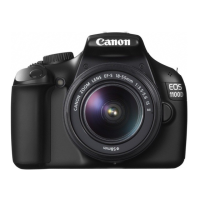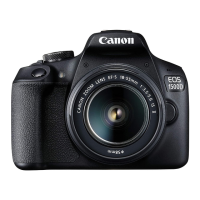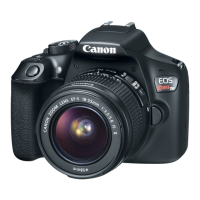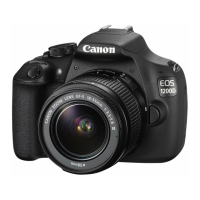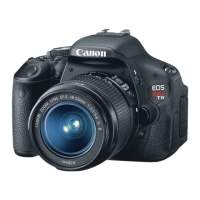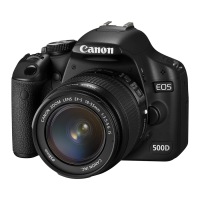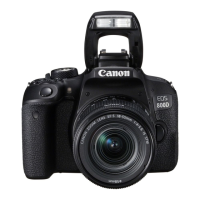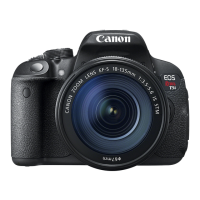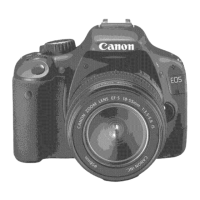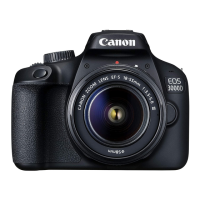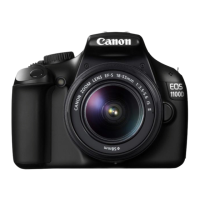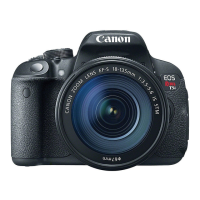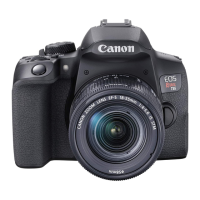
Do you have a question about the Canon EOS REBEL T8i and is the answer not in the manual?
| Camera Type | Digital SLR |
|---|---|
| Image Processor | DIGIC 8 |
| ISO Range | 100-25600 (expandable to 51200) |
| Continuous Shooting | Up to 7 fps |
| Shutter Speed | 1/4000 to 30 sec |
| Connectivity | Wi-Fi, Bluetooth |
| Battery | LP-E17 |
| Sensor | 24.1MP APS-C CMOS |
| Autofocus Points | 45 cross-type |
| Video Recording | 4K UHD at 24 fps |
| LCD Screen | 3.0-inch Vari-Angle Touchscreen LCD |
| Viewfinder | Optical viewfinder |
| Battery Life | Approx. 800 shots |
| Dimensions | 131.0 x 102.6 x 76.2 mm |
| Weight | Approx. 515 g (including battery and card) |
Lists the items included in the camera package and contact information for missing items.
Provides information on accessing the Advanced User Guide and Lens/Software Instruction Manuals.
Provides step-by-step instructions for initial camera setup and basic operations.
Explains icons used in the manual and basic assumptions for operational instructions.
Details the types of memory cards compatible with the camera and movie recording requirements.
Provides essential safety warnings and precautions for operating the camera and accessories.
Offers guidance on camera care, screen, cards, image sensor, and lens handling.
Illustrates and labels the external parts of the camera and associated diagrams.
Summarizes available EOS software, including EOS Utility, Digital Photo Professional, and Picture Style Editor.
Provides instructions on how to detach the protective cover and insert the battery into the charger.
Details the process of inserting a fully charged battery pack into the camera and closing the cover.
Explains how to insert and remove memory cards, including a caution about the write-protect switch.
Describes how to flip out, rotate, and face the camera's screen towards you.
Explains how to turn the camera on by setting the power switch to ON.
Provides instructions on removing caps, attaching lenses by aligning mount indexes, and setting the focus mode switch.
Covers fundamental camera operations like adjusting the viewfinder, holding the camera, and using buttons.
Explains how to set the information displayed on the screen according to user preference.
Details how to navigate and operate the camera's menu screens and various settings.
Explains how to directly select and set the settings displayed on the screen.
Describes touch operations like tapping and dragging on the camera's screen.
Guides users on displaying the Live View image and focusing on the subject.
Explains how to use the Self Portrait mode, face the screen, and set self-portrait specific settings.
Describes the fully automatic mode where the camera analyzes the scene and sets optimum settings.
Details how to automatically choose appropriate settings for specific subjects or scenes.
Explains how to blur the background to make the human subject stand out and soften skin tones.
Describes using the mode to make skin look more attractive and smoother.
Guides on shooting group photos where people in front and back are all in focus.
Details using the mode for expansive scenery with everything in focus from near to far.
Explains how to shoot flowers or small things up close to make them appear larger.
Guides on shooting moving subjects like running people or vehicles with continuous shooting.
Provides instructions for photographing children in motion with healthy skin tones.
Details how to take bright and appetizing pictures of food, suppressing reddish tinge under tungsten lights.
Explains how to photograph people in candlelight, reflecting atmosphere in color tones.
Guides on photographing people at night for a natural-looking scene, requiring flash and tripod.
Describes shooting night scenes in handheld mode with four consecutive shots merged.
Details shooting scenes with bright and dark areas, taking three shots at different exposures for one image.
Explains how to shoot movies with filter effects applied and preview them before shooting.
Explains how the camera automatically sets shutter speed and aperture for subject brightness.
Guides on setting shutter speed while the camera automatically sets aperture for exposure.
Details setting aperture value while the camera automatically sets shutter speed for exposure.
Explains setting both shutter speed and aperture value manually for desired exposure.
Describes how the shutter stays open as long as the button is held, used for night scenes and fireworks.
Explains using the function to prevent vibrations from mirror shock during telephoto or macro photography.
Details selecting AF operation characteristics like One-Shot AF, AI Servo AF, and AI Focus AF.
Explains AF area selection modes and how to manually select AF points or zones.
Describes AF methods like +Tracking, Spot AF, 1-point AF, and Zone AF available in Live View.
Provides instructions for focusing manually using the lens's focus mode switch and focusing ring.
Details settings for drive modes like single shooting, continuous shooting, and self-timer.
Explains how to set and use the self-timer for delayed shooting or remote control.
Guides on shooting remotely using Wireless Remote Control BR-E1 or Remote Switch RS-60E3.
Describes the four metering modes: Evaluative, Partial, Spot, and Center-weighted average.
Explains how to brighten or darken the standard exposure set by the camera.
Details how to lock exposure to set focus and exposure separately or for multiple shots at same exposure.
Provides instructions on manually raising the flash and pressing the shutter button halfway.
Covers settings for built-in and external flash, including Flash Firing, E-TTL II Metering, and Red-Eye Reduction.
Details compatibility and usage of EL/EX Series Speedlites and other flash units.
Explains setting up receivers and positioning for wireless flash photography via optical transmission.
Describes simple and basic fully automatic wireless flash photography with one external flash unit.
Details fully automatic wireless flash photography using multiple external flash units and built-in flash.
Covers settings for still photo shooting, including tab menus, image quality, and aspect ratio.
Describes movie recording settings, including autoexposure, manual exposure, and ISO speed.
Details shooting settings accessible via tab menus for viewfinder shooting.
Details shooting settings accessible via tab menus for Live View shooting.
Explains how to set image quality for RAW and JPEG images, including resolution and maximum burst.
Describes how to change the image's aspect ratio for JPEG and RAW images.
Explains how to set the duration the captured image is displayed after shooting.
Details the setting that prevents the camera from shooting unless a card is inserted.
Explains how the camera compensates for vignetting, distortion, and chromatic aberration.
Guides on capturing three images at different exposures (AEB) and setting exposure compensation.
Explains how to set the ISO speed to suit ambient light levels, including auto and manual settings.
Details automatic correction of brightness and contrast for shots that look dark or have contrast issues.
Explains how to reduce overexposed, clipped highlights for improved gradation.
Allows setting the duration the metering timer runs after being triggered.
Covers white balance settings, including Auto, Custom, and Color Temperature adjustments.
Explains how to manually adjust white balance using a grid for blue/amber or magenta/green bias.
Details the range of reproducible colors, recommending sRGB for normal shooting.
Describes selecting preset Picture Styles for photographic expression or subject matching.
Guides on customizing Picture Styles by changing default settings for sharpness, contrast, etc.
Explains how to select a base Picture Style, adjust it, and register it under User Def. 1-3.
Covers Long Exposure Noise Reduction and High ISO Speed Noise Reduction features.
Details acquiring and appending Dust Delete Data to erase sensor dust spots automatically.
Explains how to enable anti-flicker shooting to reduce uneven exposure and color under flickering light.
Describes keeping subjects generally in focus in Live View shooting for immediate focus.
Specifies how manual focus adjustment is used with One-Shot AF for EF or EF-S lenses.
Explains specifying the use of AF-assist beams from the built-in flash or Speedlite.
Provides precautions for image quality, internal temperature, and shooting results.
Details movie recording settings like movie rec. size, digital zoom, and sound recording.
Explains how autoexposure control takes effect to suit the scene's current brightness.
Guides on manually setting shutter speed, aperture value, and ISO speed for movie recording.
Details setting ISO speed manually or selecting AUTO in Manual mode for movies.
States the range of shutter speeds available in Manual mode for movies.
Provides information on icons displayed on the movie recording screen and recording precautions.
Explains recording high dynamic range movies that retain detail in highlights of high-contrast scenes.
Guides on recording movies with filter effects applied, selecting filters, and adjusting their levels.
Details setting image size, frame rate, and compression method for movies.
Provides information on recording 4K movies, card requirements, and frame rates.
Lists available frame rates for NTSC and PAL TV systems for movie recording.
Explains compression methods like IPB (Standard) and IPB (Light) for efficient recording.
States that all movies are recorded in MP4 format with the .MP4 file extension.
Provides details on cards for movie recording quality, performance requirements, and formatting.
Explains how movies exceeding 4 GB are handled with SD/SDHC and SDXC cards.
Provides details on file sizes and recording time for each movie recording size.
States the maximum recording time per movie is 29 min. 59 sec.
Guides on using digital zoom (approx. 3-10x) with specific recording sizes.
Explains how movie recording can be started by the self-timer.
Covers recording sound with built-in or external microphones and adjusting sound-recording level.
Details the feature that reduces camera shake during movie recording with digital stabilization.
Explains creating time-lapse movies by stitching still photos at set intervals.
Guides on recording short video snapshots and combining them into a video snapshot album.
Describes enabling the function for continuous subject focus during movie recording.
Lists and explains various other menu functions related to movie recording.
Provides essential precautions for movie recording, including internal temperature and image quality.
Details playback settings like protecting images, rotating stills, erasing images, and print ordering.
Covers single-image display and shooting information display for reviewing images.
Explains how to switch to index display and select images from multiple views.
Guides on switching to magnified view, scrolling the image, and reducing display.
Details how to switch to playback, select a movie, and play it back using the playback panel.
Explains how to specify and edit the beginning or end parts of a movie clip.
Guides on selecting individual frames from 4K movies to save as JPEG still images (Frame Grab).
Details connecting the camera to a television via HDMI cable for playback.
Explains how to protect single images, specify ranges, or protect all images on a folder or card.
Describes how to rotate displayed images to the desired orientation.
Explains manually changing movie orientation information for proper playback on other devices.
Guides on erasing images one by one or in batches, with cautions about protected images.
Details DPOF for printing images according to instructions like image selection and quantity.
Explains specifying images for printing in a photobook, useful for online photobook ordering.
Describes applying filter processing to images and saving them as separate images.
Guides on processing RAW images to create JPEGs using the camera or EOS Utility.
Explains processing RAW images by applying preferred effects and saving them as JPEGs.
Details selecting the type of RAW image processing performed from the Quick Control screen.
Explains automatic correction of red-eye portions in images by firing the red-eye reduction lamp.
Guides on creating video snapshot albums by recording short video snapshots.
Describes cropping captured JPEG images and saving them as new images.
Explains resizing JPEG images to lower pixel count and saving them as new images.
Details rating images on a scale of 1-5 to help organize them.
Guides on playing back images on the card as an automatic slide show with desired settings.
Explains filtering image display based on search conditions like rating, date, folder, protect, or file type.
Describes using the main dial to jump through images forward or backward according to the set jump method.
Explains how to display brightness and RGB histograms for exposure and color analysis.
Details displaying AF points used for focus, outlined in red on the playback screen.
Explains how playback resumes from the last displayed image or most recent shot.
Guides on viewing RAW images in HDR by connecting the camera to an HDR TV.
Details wireless settings including Wi-Fi/Bluetooth connection, airplane mode, and GPS device settings.
Explains connecting to smartphones, computers, printers, and web services via Wi-Fi/Bluetooth.
Guides on establishing Bluetooth and Wi-Fi connections with smartphones, and using the Camera Connect app.
Details connecting the camera to a computer via Wi-Fi for remote operation using EOS Utility.
Explains connecting the camera to a PictBridge-compatible printer via Wi-Fi for direct printing.
Guides on sending images directly from the camera to the image.canon cloud service.
Details connecting to Wireless Remote Control BR-E1 via Bluetooth for remote control shooting.
Provides steps to reconnect to devices or Web services with registered connection settings.
Explains registering up to 10 connection settings for wireless communication functions.
Covers Wi-Fi settings like Wi-Fi, Password, Connection history, and Auto send images to computer.
Details Bluetooth settings, including enabling/disabling the function and checking connection information.
Explains how to change the camera nickname displayed on smartphones and other cameras.
Guides on setting up GPS Receiver GP-E2 or a Bluetooth-enabled smartphone for geotagging.
Details how to change or delete connection settings by terminating Wi-Fi connections.
Explains how to temporarily disable Wi-Fi and Bluetooth functions.
Describes deleting all wireless communication settings to prevent information exposure.
Guides on checking error details and the camera's MAC address.
Explains how to use the virtual keyboard for entering text, including cursor keys and input modes.
Provides guidance on displaying error details and eliminating causes for connection issues.
Offers corrective actions for transmission rate drops, connection loss, or other wireless communication problems.
Discusses potential security risks like transmission monitoring and unauthorized network access.
Provides instructions for checking network settings on Windows and macOS.
Explains how to check the status of Wi-Fi and Bluetooth connections and wireless signal strength.
Details menu settings within the Set-up tab, covering folders, file numbering, and auto rotate.
Guides on creating and selecting folders to save captured images.
Explains file numbering methods: Continuous, Auto Reset, and Manual Reset.
Describes the setting to automatically straighten images shot in vertical orientation.
Explains adding orientation information to vertically held movies for playback on other devices.
Provides instructions on formatting the memory card, with a caution about data erasure.
Details how to change the camera's auto power off time.
Explains how to adjust the brightness of the camera's screen.
Describes setting the screen to turn off/on when the shutter button is pressed halfway.
Guides on setting the time zone first, then adjusting date and time.
Allows selection of the desired language for the camera interface.
Details setting the video system (NTSC or PAL) for display and frame rates.
Explains touch-screen operations and sensitivity settings.
Covers enabling or disabling camera beeps for focusing and touch operations.
Allows checking battery conditions, including remaining capacity and recharge performance.
Provides instructions for cleaning the camera's image sensor automatically or manually.
Details options for displaying electronic level, grid, and flicker detection in the viewfinder.
Explains selecting information to display on the screen when the INFO button is pressed.
Describes displaying grid lines in Live View or movie recording to help level the camera.
Allows setting functions performed by pressing the shutter button during movie recording.
Explains switching functions of AF point selection and AE lock buttons for convenience.
Details setting the image output resolution for television or external recording devices via HDMI.
Specifies camera controls to lock to prevent accidental setting changes.
Guides on setting custom functions organized into Exposure, Autofocus/Drive, and Operation/Others.
Explains restoring camera settings to defaults, including shooting and menu settings.
Details checking and deleting copyright information, which is recorded as Exif information.
Covers downloading manuals, viewing certification logos, and updating firmware.
Allows registering frequently adjusted menu items and Custom Functions on the My Menu tab.
Details three methods for importing images: interface cable, card reader, and Wi-Fi.
Explains powering the camera using a DC Coupler and AC Adapter for continuous operation.
Provides solutions for common camera problems including power, shooting, wireless, operation, display, and playback.
Explains how to display error details and find causes/countermeasures for camera errors.
Illustrates the camera system with bundled accessories and compatible external devices.
Details ISO speed settings for movie recording in different shooting modes.
Covers information displayed on Quick Control, Live View, Movie Recording, Scene Icons, and Playback screens.
Explains the camera's AF sensor with 45 AF points and their patterns for focusing.
Classifies lenses into groups (A-H) and details AF points, patterns, and frame shapes.
Provides technical specifications for the camera's type, image sensor, recording system, and interfaces.
